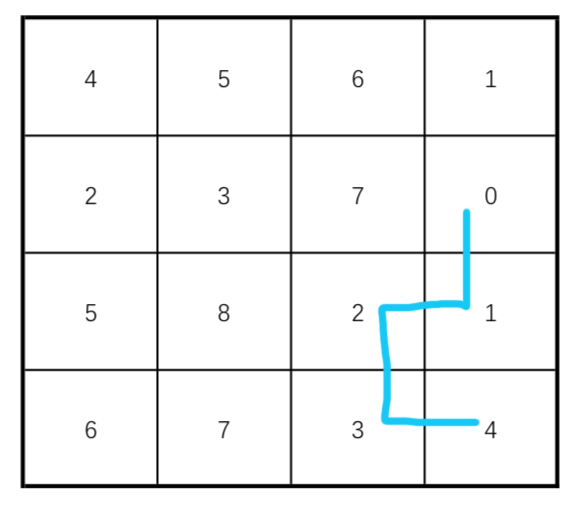Find the longest route with the smallest starting point
前提:对于一个给定的二维整数矩阵,如果一个元素i的某个4-相邻位置上的另一个元素j正好值为i-1则i到j可以形成一条通路。
输入:M个N*N整数矩阵;
输出:对于每个输入的矩阵,输出 矩阵中可形成的最长通路长度 及 在该最长通路长度的情况下最小的起始点值。
e.g.
input:
4 5 6 1 2 3 7 0 5 8 2 1 6 7 3 4

output:
4 0
idea:
遍历输入矩阵中每个位置,compute()计算以该位置为起点的最长route长度->找出 最长route长度 及 该长度下最小的起点值。
compute(r,c)
traverse 4个方向上的相邻位置: if 当前位置到该相邻位置(nr,nc)可以形成通路(input[r][c]==input[nr][nc]-1) neighbor_route_length:=compute(nr,nc) end end if traverse 完4个方向上都没形成任何通路,返回0 else 有找到通路,返回 neighbor_route_length的最大值+1
-----------------------------------分割线
可以引入缓存矩阵buffer[N][N]作为hash table存储先前计算过的compute(r,c)值
i.e. 对于某个确定可以形成通路的相邻位置(nr,nc),如果buffer中有缓存已经计算过的route_length值,则不再调用compute,直接提取buffer[nr][nc]。
compute2(r,c)
traverse 4个方向上的相邻位置: if 当前位置到该相邻位置(nr,nc)可以形成通路(input[r][c]==input[nr][nc]-1) if buffer[nr][nc]已有记录 neighbor_route_length:=buffer[nr][nc] else //没有记录 neighbor_route_length:=compute(nr,nc) end end end if traverse 完4个方向上都没形成任何通路,返回0 else 有找到通路,返回 neighbor_route_length的最大值+1
code:
class Solution { public: pair<int,int> getAnswer(vector<vector<int>> input) { int N=input.size(); vector<vector<int>> buffer(N,vector<int>(N,-1)); int longest_length=-1, starting_point=-1; for (int r=0;r<N;r++) { for (int c=0;c<N;c++) { int current_length=compute_route(N,input,buffer,r,c); if (current_length>longest_length|| (current_length==longest_length&&starting_point>input[r][c])) { longest_length=current_length; starting_point=input[r][c]; } } } return pair<int,int>(longest_length, starting_point); }
//虽然突然想起好像原始题目是每个位置的所有4个方向中只有最多一条通路
//但是因为比较无聊就加大一点难度:每个位置有可能有多条通路 要找出最长的一条 罢了 //what if there might be more than 1 route from a starting point int compute_route(int N, vector<vector<int>>& input, vector<vector<int>>& buffer, int r, int c) { int neighbors[4][2]={{r-1,c},{r,c-1},{r,c+1},{r+1,c}}; int neighbor_route_length=-1, answer; for (int i=0;i<4;i++) { int neighbor_r=neighbors[i][0], neighbor_c=neighbors[i][1]; if (neighbor_r>=0&&neighbor_r<N&&neighbor_c>=0&&neighbor_c<N) { if (input[neighbor_r][neighbor_c]==input[r][c]+1) { if (buffer[neighbor_r][neighbor_c]!=-1) { neighbor_route_length=max(neighbor_route_length, buffer[neighbor_r][neighbor_c]); } else { neighbor_route_length=max(neighbor_route_length,compute_route(N, input, buffer, neighbor_r, neighbor_c)); } } } } if (neighbor_route_length==-1) //no route found answer=0; else answer=neighbor_route_length+1; buffer[r][c]=answer; return answer; } };




